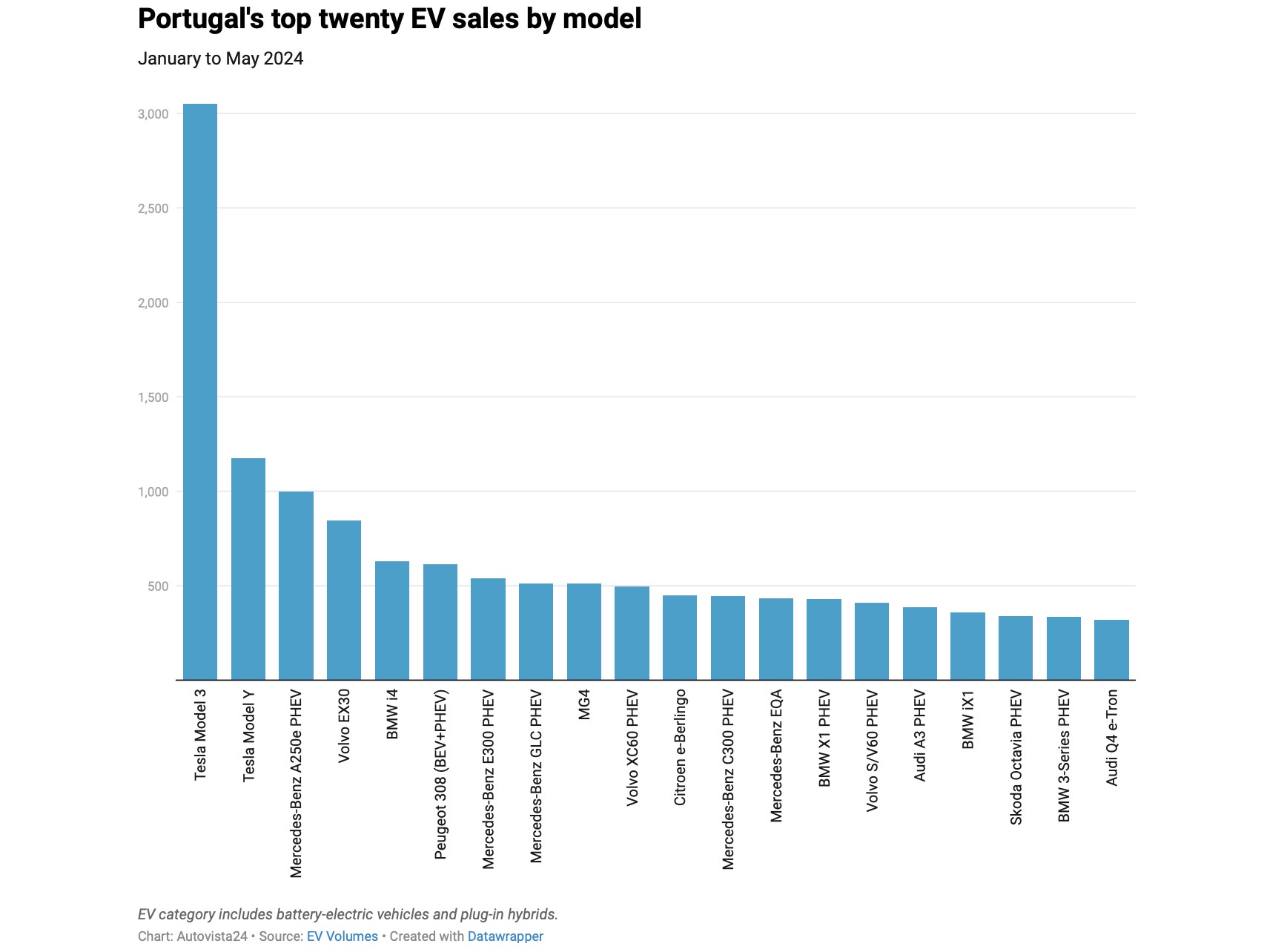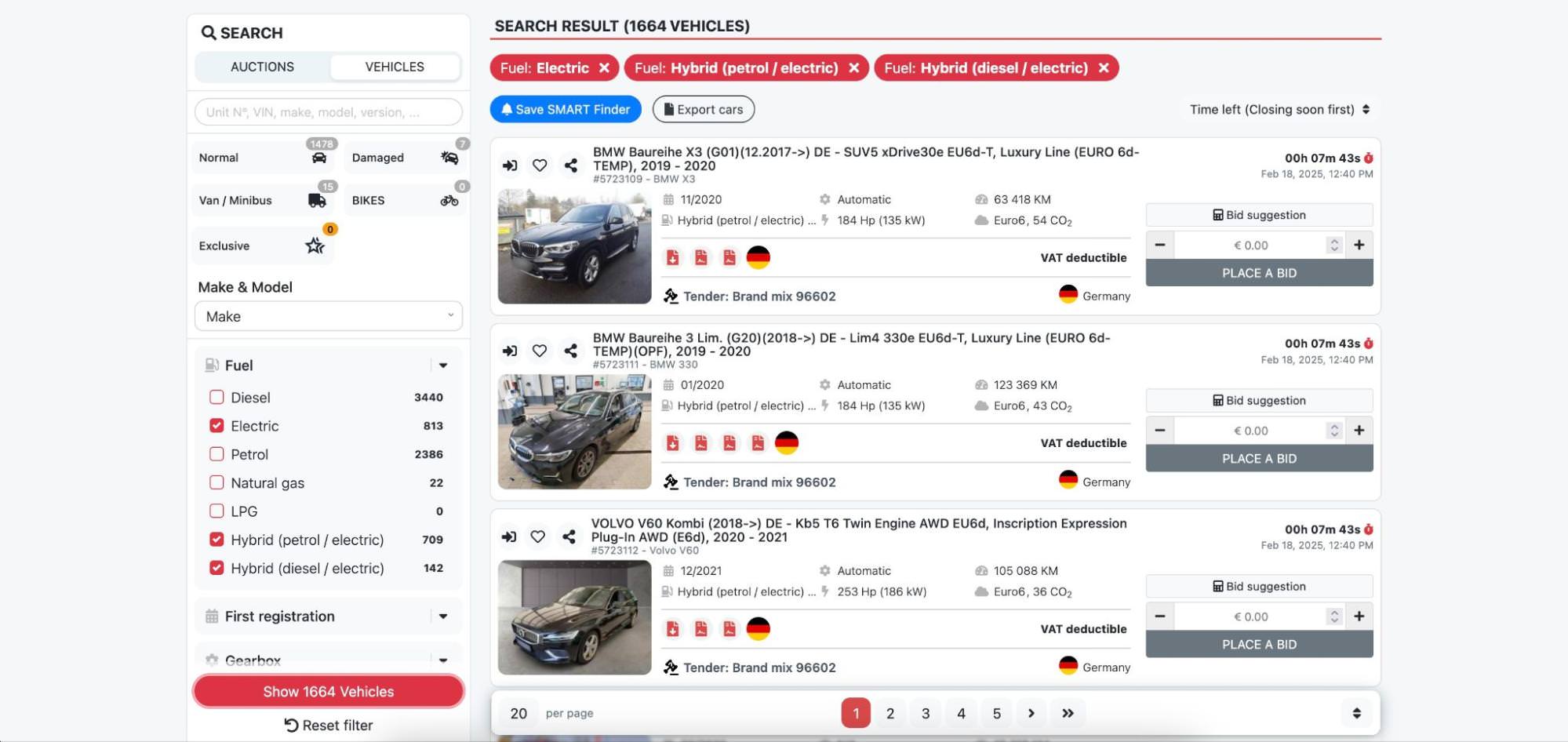- Blog
- Taxes for Hybrid Vehicles Imported to Portugal
Taxes for Hybrid Vehicles Imported to Portugal
Discover the latest import rules and incentives for EVs and hybrids in Portugal, take advantage of 2025 tax benefits, and source the best deals from the EU hassle-free.
About this article

Key takeaways
- EVs offer the biggest tax advantages, including full ISV and IUC exemptions on models priced up to €62,500.
- PHEVs still benefit from major tax breaks, including a 75% ISV discount and 100% VAT deduction on vehicles priced up to €50,000.
- Older PHEVs from 2015-2020 with at least 25 km of electric range now qualify for a 25% ISV discount, a tax break that wasn’t available before.
- Portugal’s 2025 tax changes eliminate the ISV disadvantage for imported used cars, making it easier and more cost-effective to source hybrids and EVs from the EU.
- Stocking both BEVs and hybrids helps dealers attract more buyers by offering tax-friendly EVs while still appealing to those who prefer the flexibility of a hybrid.
Importing used cars from the EU to Portugal is an excellent opportunity for dealers to supply their dealerships with popular models. Hybrids have gained popularity in recent years due to their lower emissions and fuel savings, which makes them a good option to consider when stocking up.
To keep the import of used hybrids to Portugal legal and efficient, you have to know the key tax rules. So, let’s see what you have to know about car taxes and deductions for hybrids so that you can start importing right away.
Popularity of EVs and hybrids in Portugal
Hybrids and other types of electric-powered vehicles have been consistently performing well in Portugal.
Mobility Portal Europe states that in December 2024 alone, over 10,000 EVs were sold, and battery electric vehicles (BEVs) made up about 7,000 of those.
2024 was overall a good year as it saw a 10.31% increase in EV registrations compared to the previous year, with BEV sales rising by 14.7% and PHEV sales growing by 4.5%. Essentially, these trends tell us that here’s a steady demand for electrified vehicles in Portugal.
Looking at the top twenty EV sales in Portugal in the first half of 2024, you’ll see several plug-in hybrid (PHEV) models in there.

Image source: Autovista24
The Mercedes-Benz A250e PHEV is the best-selling hybrid, landing just behind the Tesla Model 3 and Model Y in overall sales.
Other notable models include:
- Peugeot 308 (BEV + PHEV)
- Mercedes-Benz E300 PHEV & GLC PHEV
- Volvo XC60 PHEV & S/V60 PHEV
- Audi A3 PHEV & BMW X1 PHEV
- Skoda Octavia PHEV & BMW 3-Series PHEV
So, if you consider all the tax breaks that used imported hybrids get, and choose models that are proven to sell well, you can attract buyers to your dealership and turn significant profits.
Hybrid and EV taxes you need to be aware of in Portugal
Let’s go over specific taxes that you’ll encounter when buying and importing hybrids and EVs in Portugal.
► ISV
ISV (Imposto Sobre Veículos) is a tax that’s only paid once, during the first registration in Portugal.
Note that tax rates are different for individuals and for companies. We’ll talk about taxes for companies here, because you’re operating as a registered dealership business.
So, EVs and hybrids are charged at discounted rates, as follows:
- Plug-in hybrids (PHEVs) with at least 50 km of electric-only range and CO2 emissions below 50 g/km get a 75% discount on ISV.
- Standard hybrids that meet the same 50 km electric range and 50 g/km CO2 emission limit get a 40% ISV discount.
- Fully electric vehicles are exempt from ISV.
► IUC
The IUC (Imposto Único de Circulação) is an annual road tax based on factors like engine size, CO2 emissions, and vehicle age.
Fully electric vehicles are exempt from paying the IUC, but hybrids aren’t. The good news is that their lower emissions usually mean they pay less than regular gas or diesel cars.
► VAT
In Portugal, the standard VAT (Value Added Tax) rate is 23%. For businesses, VAT on electric and plug-in hybrid vehicles can be fully deducted. The deduction also applies to electricity costs for charging these vehicles.
Here’s a breakdown of VAT deductions for EVs and hybrids:
Fully electric vehicles (EVs)
- 100% VAT deduction on the purchase, import, lease, or conversion of EVs, as long as the vehicle costs €62,500 or less.
- 100% VAT deduction on electricity used for charging EVs.
Plug-in hybrid & hybrid vehicles
- 100% VAT deduction on the purchase, import, lease, or conversion of PHEVs up to €50,000.
- 100% VAT deduction on electricity used for hybrids and PHEVs.
Tax changes in 2025
Besides standard taxes, you’ll have to bear in mind some tax changes that Portugal’s State Buget introduced in 2025.
These could directly impact your dealership’s costs and tax obligations, so make sure you stay informed and adjust your strategy accordingly. Here are the changes you’ll see as of 2025.
Autonomous taxation exemptions (for BEVs and PHEVs)
Autonomous taxation in Portugal refers to a tax on company expenses for passenger cars, light goods vehicles, motorcycles, and mopeds. In 2025, the government lowered the tax rates slightly and increased the price limits for each bracket.
Here’s how the new tax rates compare to the previous ones:
- 8% (was 8.5%) for vehicles costing under €37,500 (previously €27,500).
- 25% (was 25.5%) for vehicles priced between €37,500 – €45,000 (previously €27,500 – €35,000).
- 32% (was 32.5%) for vehicles costing €45,000 or more (previously €35,000+).
How does that work in practice?
Let’s say that a company buys a PHEV for €12,000 in 2025.
Under the previous 2024 tax rates, the tax rate was 8.5%, so the company would have paid €1,020 in autonomous taxation. But under the new 2025 tax rates, the rate is now 8%, reducing the tax to €960.
While this may not be a massive amount for a single car, fleets and businesses that buy multiple vehicles will see noticeable savings over time.
ISV changes
The budget revision also targeted ISV reductions for plug-in hybrid vehicles (PHEVs). Vehicles first registered between January 1, 2015, and December 31, 2020, with a minimum electric range of 25 kilometers, now qualify for a 25% ISV reduction.
Let’s review this: the 75% discount for newer PHEVs (50 km+ range) still applies, just like the 40% discount for standard hybrids.
However, 2025 brought an additional change in which older PHEVs (from 2015 to 2020) with at least 25 km of electric range now qualify for a 25% ISV discount, which wasn’t available before.
There’s another measure that levels the playing field between imported used cars and new cars in Portugal. Starting in 2025, used vehicles imported from the EU will be taxed the same way as new cars registered for the first time in Portugal.
This change removes the previous tax disadvantage for imported used cars. For dealers, this could mean lower costs and more opportunities to import high-demand models without the extra tax.
How to source used EVs and hybrids from eCarsTrade?
All things considered, traders importing used hybrids to Portugal have great opportunities to stock their lots at lower prices. With eCarsTrade, sourcing cars internationally has never been easier.
eCarsTrade is a specialized platform for online auctions of ex-lease vehicles. The platform’s purchasing options (auctions, fixed prices, and our stock) and detailed filtering by vehicle type and fuel make it easy to find the right second-hand EVs and hybrids for your dealership.

When you open the listings, you can select only EVs or hybrids that you want to import and resell. That way, you save time by focusing only on vehicles that match your business needs.
Once you’ve narrowed down your selection, you can do a thorough online inspection by looking at the car’s history report, condition details, and high-quality photos to make an informed buying decision.
Finally, you can make the purchase directly within the platform. You’ll find your purchase invoice there, meaning that you already have a vital document you’ll need for the import process. Just like that, you’re a step closer to reselling in-demand hybrids in Portugal.
Tax breaks comparison - Hybrids vs EVs
If you’re importing or selling used hybrids and EVs in Portugal, understanding their tax benefits is crucial for pricing your inventory competitively and maximizing profits. Some taxes apply to both, but fully electric vehicles generally get bigger breaks.
Let’s break down the ISV, IUC, and VAT advantages for each so you can make the best decision for your dealership.
|
Tax type |
Plug-in hybrid (PHEV) |
Fully electric (BEV) |
|
ISV |
75% discount if CO2 emissions are under 50 g/km |
Exempt from ISV. |
|
IUC |
Lower than gasoline/diesel cars, but not exempt. |
Fully exempt from IUC. |
|
VAT |
100% deductible for vehicles costing up to €50,000. |
100% deductible for vehicles costing up to €62,500. |
What should your EV/hybrid sourcing strategy look like in 2025?
Since BEVs are fully exempt from multiple taxes, it makes sense to stock up on those.
However, it’s also wise to import hybrids as those cars let customers avoid relying entirely on Portugal’s charging infrastructure, which is still expanding.
As of 2025, sourcing cars internationally is no longer an obstacle. With EU imports now taxed the same as new cars in Portugal, the previous disadvantage of bringing in second-hand hybrids and EVs from other European markets is gone.
This means that you can source vehicles from the EU at competitive prices without additional tax burdens.
All in all, your sourcing strategy for 2025 should definitely include a mix of hybrids and BEVs from across the EU, taking advantage of the new tax rules that make international sourcing more cost-effective.
eCarsTrade blog features curated lists and rankings of:
Browse our used cars
